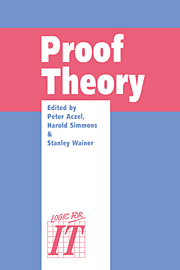Book contents
- Frontmatter
- Contents
- Preface
- Programme of lectures
- Basic proof theory
- A short course in ordinal analysis
- Proofs as Programs
- A simplified version of local predicativity
- A note on bootstrapping intuitionistic bounded arithmetic
- Termination orderings and complexity characterisations
- Logics for termination and correctness of functional programs, II. Logics of strength PRA
- Reflecting the semantics of reflected proof
- Fragments of Kripke-Platek set theory with infinity
- Provable computable selection functions on abstract structures
Provable computable selection functions on abstract structures
Published online by Cambridge University Press: 05 November 2011
- Frontmatter
- Contents
- Preface
- Programme of lectures
- Basic proof theory
- A short course in ordinal analysis
- Proofs as Programs
- A simplified version of local predicativity
- A note on bootstrapping intuitionistic bounded arithmetic
- Termination orderings and complexity characterisations
- Logics for termination and correctness of functional programs, II. Logics of strength PRA
- Reflecting the semantics of reflected proof
- Fragments of Kripke-Platek set theory with infinity
- Provable computable selection functions on abstract structures
Summary
ABSTRACT. We work in the context of abstract data types, modelled as classes of many-sorted algebras closed under isomorphism. We develop notions of computability over such classes, in particular notions of primitive recursiveness and μ-recursiveness, which generalize the corresponding classical notions over the natural numbers. We also develop classical and intuitionistic formal systems for theories about such data types, and prove (in the case of universal theories) that if an existential assertion is provable in either of these systems, then it has a primitive recursive selection function. It is a corollary that if a μ-recursive scheme is provably total, then it is extensionally equivalent to a primitive recursive scheme. The methods are proof-theoretical, involving cut elimination. These results generalize to an abstract setting previous results of C. Parsons and G. Mints over the natural numbers.
INTRODUCTION
We will examine the provability or verifiability in formal systems of program properties, such as termination or correctness, from the point of view of the general theory of computable functions over abstract data types. In this theory an abstract data type is modelled semantically by a class K of many-sorted algebras, closed under isomorphism, and many equivalent formalisms are used to define computable functions and relations on an algebra A, uniformly for all A ∈ K. Some of these formalisms are generalizations to A and K of sequential deterministic models of computation on the natural numbers.
- Type
- Chapter
- Information
- Proof TheoryA selection of papers from the Leeds Proof Theory Programme 1990, pp. 275 - 306Publisher: Cambridge University PressPrint publication year: 1993
- 3
- Cited by

